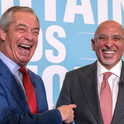Just before COP15 in 2009, Greenpeace declared that any deal struck in Copenhagen should be “nothing short of a plan to save the planet.” But the chief achievement of the negotiations then was merely the “recognition” that global temperatures should not surpass 2C above pre-industrial levels—a huge disappointment to climate advocates.
“We couldn’t get an agreement,” says David King, the UK’s former lead negotiator and chief scientific adviser. “The reason was that the United States Congress had never voted for action on climate change. President Obama could not accept an agreement, set by an international body and binding on the United States, without approval from Congress.”
China had already said before COP that if the US would not sign a binding agreement, neither would it. “Clearly, there was not going to be any progress,” King says. After Copenhagen a group of negotiators, including King, pushed for a way which would allow Obama to sign an agreement without needing approval from Congress. By 2015 they found a solution. “We said, ‘Let’s have a simple process in which every county volunteers its own contribution to the reduction of emissions.’”
The Paris agreement, made at COP21, requested all parties to produce their own plans for reducing emissions to meet the net zero carbon goal—and to update those nationally determined contributions every five years.
“COP21 was the most successful meeting of the United Nations Framework Convention since it began in 1992—there’s no question about that,” King tells me.
But the agreement was far from perfect. “I’ve got to tell you that some of those nations were cheating. For them, [after COP21] it was really business as usual. Australia was one of those. And that’s the weak part. Every country volunteered what they thought was easy to do. But nevertheless, that was the only way we could get agreement.”
In Paris, 195 nations agreed that global heating must not exceed more than 2C, compared to pre-industrial levels—with an aim, if possible, to keep it below 1.5C. King, who advocated for the 1.5 target in 2015, believes now that the current global temperature—around 1.25—is “already too much.”
“COP21 set a target, but the countries have been very poor at managing their own production processes, even to meet what they promised,” he says. “So the situation has gotten a whole lot worse since Paris, because the amount of greenhouse gas is going up to what I consider to be an unmanageable level.” The stakes could not be higher for the Glasgow summit in November, he says. “This is very much a last chance saloon.”
COP26 needs to focus heavily on rapid emissions reduction—but it should also have wider climate goals. “Even if we were to stop emissions tomorrow, we wouldn’t solve the problems that have already begun irreversibly,” King says. “We have upset the balance of our climate system in the northern hemisphere—hence all these extreme weather events.”
The Centre for Climate Repair, which King chairs, advocates a three-pronged climate approach that he calls the “three Rs”: reducing emissions, removing greenhouse gases from the atmosphere and repairing the Arctic Circle. “That’s a comprehensive strategy to create a manageable future for humanity on earth.”
He is optimistic about the potential for countries to make greater climate commitments this November.
“It’s almost impossible to get an agreement on anything if it isn’t led by the United States. But for the first time ever, we’ve got a real possibility that the US and China, together with the European Union, could play the leadership role in COP26. I think these areas of the world are very committed to action on climate change under their present leadership. The opportunity is there.
“If they pushed for a full agreement, it would be carried through. Everyone wants to be on the side of the powerful. Even Australia would follow the United States.”
His concern, however, is that the west risks jeopardising collective climate action by criticising China’s other policies—in particular, towards Hong Kong and its Uighur population. “Frankly, being critical of China does nothing to change Chinese policy—it’s a bit of trumpeting for your own audience. It’s a luxury we cannot afford. If the United States and Britain go on criticising China, we are in danger of losing the battle over climate change.”
King believes that Britain, which in 2008 became the first country in the world to get an all-party agreement on climate change, is well-suited to push for a new agreement as the host nation of COP26. “I think it’s fair to say, since 1997, Britain is the country that has been leading the way in climate actions as well as climate negotiations. During my time with Tony Blair [as chief scientific adviser], we created 165 climate experts in our embassies around the world. No other country had any. And that meant our ambassadors all understood this was a priority. We wanted to set an example.”
In the run-up to the conference, Boris Johnson has been working to encourage other countries to reach a deal in Glasgow that would, ideally, soon end the use of coal—as well as ensure that developed countries make a greater financial commitment to helping poorer nations manage climate change and its adverse effects.
“The most important thing the prime minister did in relation to COP26, in my view, was make a very clear statement at the G7 meeting this year,” King says. “He said that by 2035 we will have reduced our emissions by 78 per cent [below 1990 levels]—way ahead of any other country in the world.”
But while our targets may be impressive, we are not yet close to meeting them. King cites the Climate Change Committee, which released a damning analysis of the government’s efforts to reach its target of 78 per cent (emissions are currently down by about 50 per cent). “What they said was, unless the government introduces a coherent series of policies, we’re not going to achieve anything like that 2035 target.”
Our domestic climate policies are crucial for international efforts, King adds. “When I was negotiating, I could go from country to country and say, ‘This is what Britain is doing. What are you going to do?’ We want to be an example to every other country.”
Britain can successfully demonstrate that reducing emissions per person has not harmed our economy. “The switchover to renewable energy has been amazingly painless,” King says. “We have the biggest offshore wind industry in the world, and the most efficient.”
But King still fears that Glasgow could be another Copenhagen. “The naysayers in this whole discussion have been led in the past by the United States, and then by Saudi Arabia and Australia. The question is whether the naysayers hold sway. What we need to see is that coal, oil and gas stay in the ground, and they become of zero value in a zero-carbon society.”
Since Paris, the situation has only got more urgent. “Time is no longer on our side. That is the big difference between all the previous, painfully slow negotiations, when we tried to listen to every voice from 197 nations to get an agreement… We no longer have that luxury. What we set in train over the next five years will determine the future of humanity for the next few millennia.”













